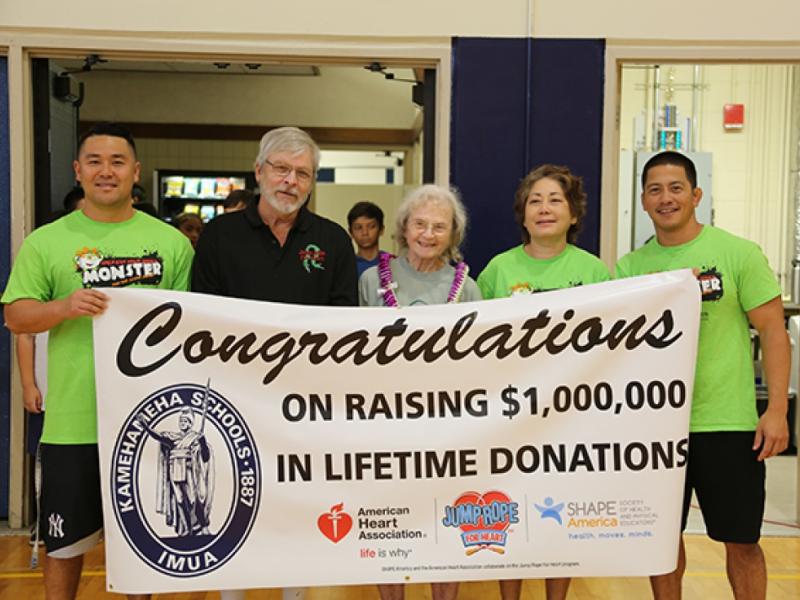NEWS RELEASE
KS Kapālama Elementary School surpasses $1 million raised participating in Jump Rope for Heart
Posted: March 9, 2018

The American Heart Association presented KES with a banner to mark this significant milestone for the Jump Rope for Heart program at Kamehameha Schools Kapālama.
The American Heart Association congratulated Kamehameha Schools Kapālama Elementary School students for helping their school surpass the $1 million raised lifetime through participation in the Association’s Jump Rope For Heart program.
Kamehameha Schools has participated in the Jump Rope For Heart program since its inception during the 1978-79 school year. The program promotes community service by raising funds to support lifesaving heart and stroke research and educational programs, while teaching physical fitness to elementary students. Students learn jump rope skills, how their heart works, and how to stay healthy, all while having fun and making a difference in the lives of others. Students also help their school earn gift certificates for free P.E. equipment. The program is sponsored by the American Heart Association and the Society of Health and Physical Educators (SHAPE).
“We are so proud to have reached this milestone in community service at our school,” said Kamehameha Schools Kapālama Elementary School Principal Ronnie Kopp. “Our students have benefited over the years of participation in Jump Rope For Heart by learning how to maintain their cardiovascular health throughout their lives. This is especially important for our students since the Native Hawaiian population has among the highest risk rates for those diseases. The students have also learned the joy of supporting their community by raising funds to support the American Heart Association’s efforts to improve cardiovascular health, improve quality of life, and reduce deaths from heart disease and stroke in our state.”
Locally, the American Heart Association has funded research at the Queen’s Medical Center which has identified higher severe stroke risk in the Native Hawaiian population at younger ages than Hawaii’s general population. That has led to the Medical Center receiving a National Institutes of Health (NIH) grant to explore why that disparity exists, and to possibly find ways to reduce it. The AHA is also working to eliminate other health-related disparities in communities in which large numbers of Native Hawaiians live, including providing access to culturally-appropriate disease prevention education, improving access to healthy foods, and expanding and protecting access to health care.
“We offer a big mahalo, and congratulations to Kamehameha Schools students for achieving this extraordinary milestone,” said Mark Yamakawa, American Heart Association-Hawaii Division Board chair. “Our hope is that through their participation in Jump Rope For Heart the students have learned key fitness skills and health lessons that they will practice throughout their lives. And their outstanding fundraising efforts will benefit and improve the communities in which they live and play.”
The American Heart Association and American Stroke Association is devoted to saving people from heart disease and stroke – Hawaii’s No. 1 and No. 3 killers. It teams with millions of volunteers to fund innovative research, fight for stronger public health policies, and provide lifesaving tools and information to prevent and treat these diseases. To learn more or to get involved locally, call the AHA’s Honolulu office at (808) 377-6630. From neighbor islands, call toll-free at 1-866-205-3256.
Media contact:
American Heart Association | Don Weisman, (808) 377-6636, don.weisman@heart.org










